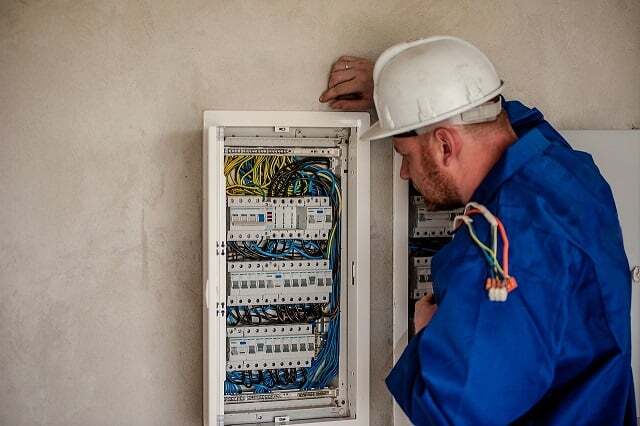As technology evolves and as new construction projects arise, electricians are in demand in Germany like never before. And if you take ongoing maintenance and greener infrastructure updates into account, you can realize that it’s probably never been more convenient to work in Germany in this blue-collar profession. But, how much does an electrician make in Germany? Is the average electrician salary in the country worth relocating, learning a new language and trying to integrate into another culture?
In this article, we’ll talk about the gross and the net electrician salary in the country, touch bases a bit on the cost of living in Germany, minimum wage, and advancement opportunities.
How Much Are Electricians Paid in Germany?
Data shows that the average electrician salary in Germany is €59,555 a year, which roughly translates into €29, while others highlight lower figures. Still, if we are going with the former, the average salary range varies between €42,403 and €71,942.
Please, keep in mind that these are only average numbers. Both net and gross electrician salary will vary depending on factors such as location, experience, and so on. And to be even more precise, here’s an in-depth breakdown of the wages you can get working as an electrician in Germany, based on the latest statistics.
| Salary Type | Amount (EUR) |
| Average Annual Gross Salary | 57.228 |
| Average Monthly Gross Salary | 4,769 |
| Median Annual Salary | 20,000 |
| Median Monthly Salary | 1,666 |
| Lowest Annual Salary | 9,460 |
| Lowest Monthly Salary | 788 |
| Highest Annual Salary | 33,520 |
| Highest Monthly Salary | 2,793 |
So, how much do electricians make a year? Please note that these figures represent ballpark figures. As you can see, different sources highlight gross salaries, before taxes, and do not highlight other factors such as experience, education level, and location. How much you will actually earn working in Germany, as an electrician will depend on a handful of factors.
Factors to Consider When Discussing Electrician Salary in Germany
How much does an electrician earn in Germany? As mentioned above, the average electrician salary in Germany will depend on several factors, including what you bring to the table. There are several things that determine your earning potential.
1. Work Experience
Like with everything else, your work experience plays a pivotal role in determining your earnings. The more experience you have in your field, the higher your salary will usually be. On that note, let’s take a closer look at your earning potential with different levels of experience.
| Experience Level | Yearly Pay (Eur) | Monthly Pay |
| Starting (0-2 years) | 10,080 | 840 |
| Intermediate (2-5 years) | 13,100 | 1,091.67 |
| Experienced (5-10 years) | 23,400 | 1,950.00 |
| Expert (10-15 years) | 28,820 | 2,401.67 |
| Senior (15-20 years) | 29,320 | 2,443.33 |
| Master (20+ years) | 33,440 | 2,786.67 |
Again, don’t forget that these figures represent the average wage for an electrician in Germany, not accounting for specialised certifications and skills which may lead to even better payment.
2. Education and Certification Level
While your actual experience and skills are what will help you earn the most, having professional certifications and a higher educational qualification can help you increase your salary.
According to expert research, the average electrician salary in Germany with a high school education averages out to 13,540 euros, while experts with additional diplomas and certificates are able to earn an average yearly salary of 19,60 euros. Lastly, the average salary of an electrician is around 34,540 euros with a bachelor’s degree (which may reach 57,200 with an MBA program).

Source: Herzing Blog
| Education Level | Average Yearly Salary |
| High School Education | €13,540 |
| Additional Diplomas/Certificates | €19,600 |
| Bachelor’s Degree | €34,540 |
| Bachelor’s + MBA Program | Up to €57,200 |
3. Private vs. Public Sector
How much do electricians make in an hour? The electrician wage in Germany also highly depends on whether you’re employed in the private or public sectors. Fortunately, electricians are in high demand in both sectors, with both offering varying levels of work conditions, job stability, and salaries.
- Public Sector: These are roles within state-owned enterprises, government organizations, and municipal projects, usually offering stable employment, standardised salaries, and regular working hours.
- Private Sector: These are the “standard opportunities” on construction projects, manufacturing plants, and independent contractors, offering variable salaries, opportunities to work overtime, and diverse work environments.
When looking at the data, the figures reveal that, on average, private sector employees earn 8% more than people working in the private sector, which may also translate into the profession of electricians.
4. Electrician Salaries by City in Germany
The average electrician salary in Germany per hour will also differ depending on the city you find work in. 2026 data shows the following salary breakdown in cities across Germany:
| City | Average Salary |
| Berlin | €23,060 |
| Bremen | €21,030 |
| Dortmund | €20,160 |
| Dreseden | €19,960 |
| Düsseldorf | €23,030 |
| Essen | €21,020 |
| Frankfurt | €24,830 |
| Hamburg | €25,020 |
| Hannover | €18,820 |
| Köln | €22,970 |
| Leipzig | €19,000 |
| München | €23,940 |
| Nürnberg | €18,900 |
| Stuttgart | €22,390 |
Why does the German electrician salary fluctuate considerably when looking at different cities? Usually, local industries, job competition, living costs, and city growth all influence salary.
For instance, only rent will set you back €1,500 to €2,000 in Berlin, where the average cost of living for a family of four hovers at €3,416.9,excluding rent. In comparison, living in cities such as Leipzig or Potsdam won’t even set you back by €2,000, according to the data.
Local industries also create specific pay differences. Some cities need industrial electricians with special skills, while in other places, employers may look for construction electricians. Job competition and city growth are also determining factors. Simply put, big bustling cities often have more construction projects. This means that there’s more demand but also more experts looking for the same roles. High demand can also lead to more competitive working conditions with extra pay benefits.
5. Average Electrician Salary in Germany By Gender
Even though we are well aware that there should be no gaps between the salaries of women and men, in Germany, the gender pay gap exists, with women earning less, on average, by 16% in 2024. This pay gap can also be observed in electrician salaries as well. More specifically, while men earn a yearly average of €23,400, women will earn an average of €21,400, which is 9% less.

Source: Ace Community College
| Gender | Average Salary |
| Female | €21,400 |
| Male | €23,400 |
6. The Electrician Average Salary Raises And Bonus Opportunities in Germany
If you’re in it for the long haul, expect an 8% salary increase every 18 months in Germany. This roughly translates into a pay raise of approximately 5% every year.
Bonuses are another significant part of your overall salary. Unfortunately, electrician roles tend to be low-bonus based jobs, meaning that these jobs aren’t involved with direct revenue generation for the employer. On average, only 35% of employees report receiving at least one bonus in the course of 12 months.
How Electrician Salaries In Germany Compare to Other Countries
The average electrician salary in Germany per month looks rather promising, but how does it compare to other countries in the EU? While Germany typically has among the best wages in the Union, there are also other serious contenders like the Netherlands and Belgium, which are also known for their competitive salaries, attractive benefits, working conditions, and overall job stability.
| Country | Monthly Gross (EUR) | Hourly Wage (EUR) |
| Germany | €4,973 | €28.71 |
| Netherlands | €2,290 | €13.22 |
| Belgium | €3,533 | €20.40 |
| France | €1,775 | €10.25 |
| UK | €3,262 | €18.84 |
And while data suggests that Germany offers the best salaries for electricians, if you look beyond the numbers, the situation becomes a bit more complicated. For instance, it is well-known that the Netherlands is globally among the top countries when it comes to managing work-life balance. It’s also among the best countries to live in Europe, and may offer several advantages over Germany, when compared side-by-side.

Source: Fleming College
Germany offers strong industry, work structure, and free education, which are all rather alluring, but with a less flexible work culture, less access to English, and may even offer better taxation options for expats.
The Average Electrician Salary in Germany Per Month and Employment Agencies
Quite a few electrician jobs in Germany are filled with the help of employment agencies. At first glance, you might notice that the salaries of these options look lower than what you’d get from direct employment. The reason for these lower figures is the fact that agencies charge a service fee, which is deducted from your base salary. This may seem like a disadvantage, but you also get additional support and services, such as:
- A simpler recruitment process: Instead of researching your options and hassle with the ins and outs of finding a job abroad, agencies can take care of the lion’s share of the process, helping you get started in a matter of weeks.
- Accommodation arrangements: Most agencies offer assistance with housing, often offering options at a lower price, allowing the worker to save more money.
- Administrative support: Agencies tend to handle the bureaucratic hassle of employment, helping you with getting your tax numbers, health insurance, bank accounts, and more.
- Transportation: Agencies will also help arrange daily transport to work in the form of company cars, buses, or vans.
- Work equipment: In some cases, the safety equipment you need during work hours will also be provided.
Robin Jobs Can Help You
The electrician’s average salary in Germany is rather attractive and if you are a qualified expert, relocating to one of Europe’s most developed countries can be an extraordinary life-changing experience.
This is why our mission at Robin Jobs is more than “just” recruitment. We’ve set up blossoming partnerships with reputable employment agencies in Germany, which allows us to conduct international recruitment smoothly. We can help you find a job with fair wages, great working conditions, good housing options, and paperwork. Allowing you to start your new job and life as fast as possible.
Start off on the right foot. Register with us today and browse among the best positions the German market has to offer.

 English
English  Lietuvių
Lietuvių  Latviešu
Latviešu  Polski
Polski  Português
Português  Română
Română  Slovenčina
Slovenčina  Magyar
Magyar  Русский
Русский  Espanol
Espanol  България
България  Čeština
Čeština  Italy
Italy  Croatia
Croatia  Greek
Greek 

